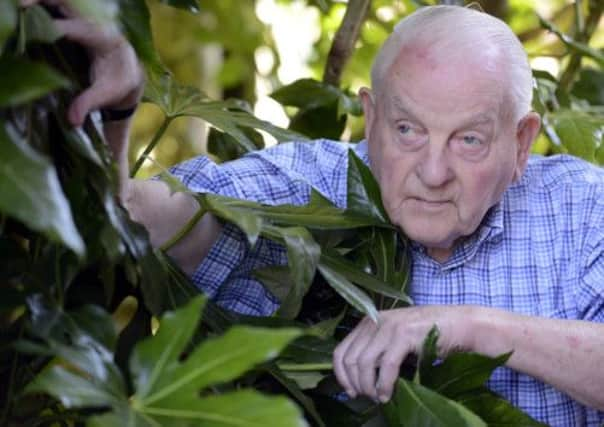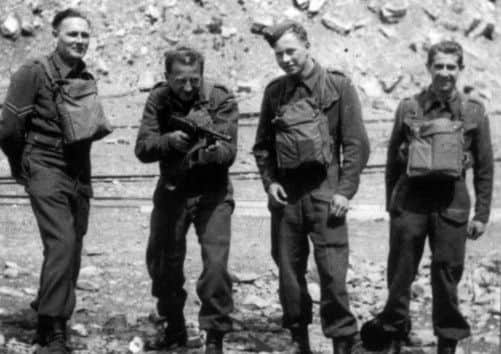Guerrilla from the mists of time


THERE is a far-away look in Claude Varley’s eyes as he recalls himself at 17.
It was the later months of 1940, or maybe early 1941, and for a moment he was convinced that the night sky over his family’s farm near Hornsea was full of German parachutists. His eyes were playing tricks; it was just a flock of seagulls.
Advertisement
Hide AdAdvertisement
Hide AdMr Varley, and everybody else on the Yorkshire coast, watched the skies every night. The threat of invasion was very real, perhaps even probable. Europe was under the Nazi jackboot, and Britain’s cities were being bombed. The broad beaches and low cliffs of Holderness were perfect for amphibious landings, the flat farmland beyond ideal for tanks to operate in, the Humber and its ports just a few miles to the south key strategic objectives.


These were among Britain’s most perilous moments, and Mr Varley was about to be drawn into one of the strangest, and least-known episodes on the home front, a cloak-and-dagger operation that is only now being officially acknowledged.
Its utmost secrecy was reinforced for Mr Varley, now 90, by having the barrel of a revolver rammed into his face, with the threat of being shot if he told anybody. He kept the secret for decades, and even now struggles to talk about it. His parents went to their graves without ever knowing the part he played. His first wife never knew, and he was in old age before he spoke a word of it to his children.
Mr Varley was part of Winston Churchill’s secret army of a few thousand men, selected because of their encyclopaedic knowledge of the areas where they lived. The prime minister was an enthusiastic supporter of a network of civilian saboteurs who would harass invading forces.
Advertisement
Hide AdAdvertisement
Hide AdMany, like Mr Varley, were farmers, a reserved occupation. They were trained in guerrilla warfare, armed with guns and explosives, and in the event of an invasion were to go into underground bunkers from which they would mount raids behind the enemy’s lines to kill as many as they could.
There were ruthless tasks to be carried out amongst their neighbours, too. Those suspected of being likely collaborators were to be identified and executed, and for Mr Varley, that would mean killing three local men regarded as too garrulous and inquisitive for their own good.
The secret army’s task verged on the suicidal. Officially, each man was expected to survive no longer than two weeks if the Germans landed. Of course, they never did, but Mr Varley and the rest remained on alert until being stood down in 1944 when it was clear that the Allies were winning the war.
At its end, the secret army’s existence was revealed, but then history largely forgot about it, and its men were forgotten too because they were obliged to remain silent. Now, for the first time, a small contingent of the dwindling band of survivors is to take part in this year’s Remembrance Day commemorations at The Cenotaph, long-overdue official recognition of their contribution to the war effort having been announced in spring this year.
Advertisement
Hide AdAdvertisement
Hide AdMr Varley, though sprightly, won’t be going. The day will be too long, with too much standing for him to manage. He is among the last survivors of the British secret resistance, known as Auxiliary Units, which numbered only about 3,500 men nationally.
Its headquarters were at Coleshill House, in Oxfordshire, and a network of volunteer historians, called the Coleshill Auxiliary Research Team (CART), has drawn information about them and their role together into a comprehensive online archive, as well as leading the successful campaign to persuade the Royal British Legion to accept survivors into the remembrance commemorations.
In Yorkshire, CART has found only two survivors, Mr Varley and another man, who has stuck to his vow of silence. They are believed to be the last of more than 300 men who served in 56 patrols of about six men each, 34 of them in East Yorkshire and 22 in North Yorkshire, predominantly based on the coast.
Engineers built underground bunkers in the countryside for them to operate from, where explosives and weapons were stored. Three survive, at Middleton-on-the-Wolds – the regional headquarters of the auxiliary units – Rise and Cottingham.
Advertisement
Hide AdAdvertisement
Hide AdMr Varley, who still lives in Hornsea where he farmed until retiring at 73, was hand-picked for the Bewholme patrol by a local Home Guard commander, and he guessed why. “I had a dangerous nature. I was a real quiet man, but I know I could have shot a man with no bother. They called me the killer of the group. I just fell into it. I was a bit of a wild boy.
“I was a lucky man, I had a nature for killing Germans and I remember going to a lecture with a big man from the top, and he patted me on the back and said, ‘Now then, young man, what are we going to do?’, and I said, ‘We’re going to kill Germans’, and he said, ‘That’s the answer I want’.”
Mr Varley was given the tools to do it. A sniper rifle, revolver, array of knives, plastic explosives, phosphorous anti-personnel grenades and the so-called “sticky bomb”, designed to be stuck to armoured vehicles.
There was weapons training at Middleton-on-the-Wolds and unarmed combat. In a twist that could come straight from an espionage thriller, manuals on guerrilla warfare were hidden inside innocuous covers that looked like diaries, calendars or brochures from agricultural feed suppliers.
Advertisement
Hide AdAdvertisement
Hide AdThere was something else, too. “I was given this bit of paper, and if we were invaded, I had two or three names on that slip of paper who I had to shoot,” recalled Mr Varley.
The need for secrecy was hammered home. “Nobody knew a thing from any of us, because if we did, we would have been shot. I was on a course with another guy who had a revolver in his hand, and he pushed it in my face. ‘You must not talk, or you will be shot’.
“My mother never knew what we were doing. My father didn’t know, we went out at night, and as far as they knew we were going to the Home Guard. Even after the war was over, they didn’t know. They died without ever knowing.”
Night patrols were sometimes spent probing security at the airfield in nearby Catfoss, with Mr Varley and his comrades sneaking past sentries to leave dummy bombs aboard planes. The following morning, the base commander would be alerted and told to increase watchfulness.
Advertisement
Hide AdAdvertisement
Hide AdIt was a waiting game for an enemy that, ultimately, never came, but Mr Varley and his comrades honed their skills constantly, vanishing so completely into the woods and fields that even soldiers passing close by never spotted them. “I was a bit crafty, I could get out of sight,” he said. But they all knew the chances of survival were slim if the Germans invaded. “How long we would have lasted, I don’t know.”
The strict secrecy surrounding the auxiliaries continued even when they were stood down. They were told the Official Secrets Act obliged them to remain silent for 50 years, and Mr Varley complied. “My son said, ‘Why didn’t you tell us, Dad?’ and I said, ‘No, it was secret, and I kept that secrecy’.”
He is glad that the secret army’s contribution is now, at long last, being recognised at The Cenotaph, but the pressure he was put under never to disclose anything about it has left its mark. “I couldn’t get it off my chest,” said Mr Varley. “It’s very difficult, even now. When you’re stood there with a gun at the end of your nose and told, ‘You speak and you’ll be shot’, it’s very difficult to leave that behind. It was questions from my family that made me speak about it, but even today, I can’t just meet somebody and talk about it.”
CART is keen to hear from any other veterans of the Auxiliary Units, or their relatives. Its website, which tells the story of the units, is www.coleshillhouse.com email is [email protected] or it can be contacted by telephone on 0872 045 9940.